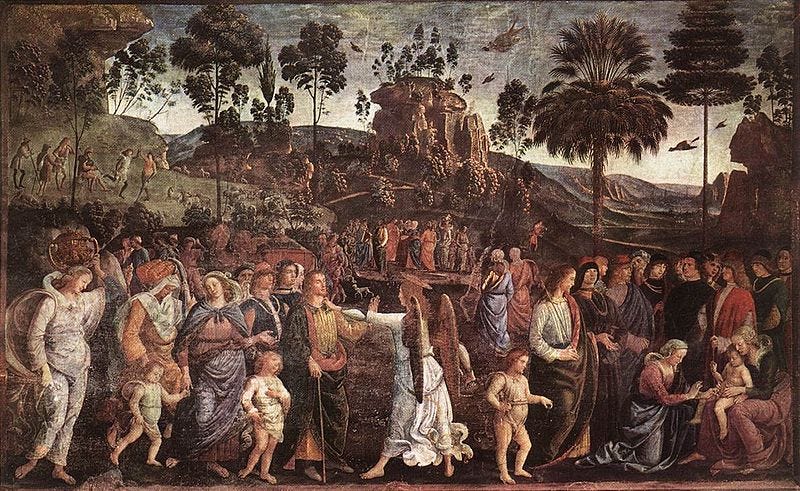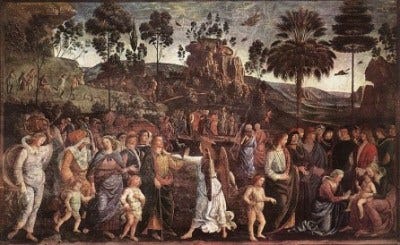Paedocommunion Series: God Really, Really Cares


Perugino, “Moses’s Journey into Egypt and the Circumcision of His Son Eliez” (c 1482).
THE CURRENT SERIES
Is about Paedocommunion, but we are slowly working our way up to it. The first two posts were about the biblical teaching that we expect covenant children normatively to have faith from the womb (Paedofaith). Now we move on to Paedobaptism – by talking about Moses and circumcision. Eventually we will get to Paedocommunion proper.
To see Part 1: A Simple Experiment
To see Part 2: Some Kinda Faith or a Nuther
——————–
I LEFT YOU HANGING WITH…
Moses.
And Pharaoh.
Both made God mad enough to kill.
BECAUSE GOD LOVES HIS CHILDREN
Israel had been promised an inheritance. A gift from their father. Israel was God’s firstborn son. As the son of the King of the earth, Israel would go out as Prince of the earth, ruling in God’s place – as a messenger, showing forth God’s image, and being a blessing to the world. God had sealed to Israel this promise of blessing all the nations of the earth eventually, but along the way, there would be some who did not treat them well. God would bless their benefactors, and curse their enemies.
I will bless those who bless you, and him who dishonors you I will curse, and in you all the families of the earth shall be blessed. (Gen 12.3)
This is a story about one of Israel’s enemies, and about marking the difference in “mine” and “not mine.”
MARKING OUT
Israel had been marked as God’s son by the sign of circumcision when God had adopted Abraham (Gen 17), and that’s really a story to repeat. Just hang on for it. I will tell you about it later, I promise. But that sign – the cutting, the blood in the middle of his body was a sign to God as father that when he looked said, “SON.” As a king, when God ruled, it was a sign that said, “PRINCE.” As a judge when God passed by, it was a sign that said, “MINE.”
But, lo and behold, Israel had been kidnapped by Pharaoh. Israel was in bondage making Pharaoh’s things and working Pharaoh’s land. But Israel was God’s child and not a slave. A son of God’s royal line. A prince does not belong in bondage in someone else’s kingdom. Especially not God’s prince.
So God called forth a Messenger, Moses. Moses had been adopted too – by Pharaoh’s daughter. But that had been eighty years ago. And a different Pharaoh was sitting on God’s inheritance now. So God called forth Moses to go to that manstealer, Pharaoh, and to tell him that the son was to be set free.
Then you shall say to Pharaoh, ‘Thus says the Lord, Israel is my firstborn son, 23 and I say to you, “Let my son go that he may serve me.” If you refuse to let him go, behold, I will kill your firstborn son.’” (Exodus 4.22-23)
God. Mad enough to kill.
MOSES NEEDS TO HEED THE WARNING
So Moses knew this was a parent-child issue. And that it was about inheritance (especially as Israel was a “firstborn,” receiving a double portion of inheritance. God had called him to tell Pharaoh to cut Israel off and out of Egypt. Because Israel was God’s. His son. Marked out for promise.
However, Moses was not himself paying attention to such rules.
Look at the very next verses:
24 At a lodging place on the way the Lord met him and sought to put him to death. 25 Then Zipporah took a flint and cut off her son’s foreskin and touched Moses’ feet with it and said, “Surely you are a bridegroom of blood to me!” 26 So he let him alone. It was then that she said, “A bridegroom of blood,” because of the circumcision. (Ex 4.25-26)
Moses had said God’s firstborn was important enough for God to come after and rescue. Moses had said the firstborn was good enough payment for Pharaoh to make in exchange for Pharaoh’s disobedience, then God would still get his son. But in all this talk of firstborns and inheritance, what was Moses handing down to his own? Moses had also failed to obey, he had failed to mark him out, and he had made God angry.
Zipporah had only to fix one child’s midsection before the Lord relented, so it is likely they had only one son (assuming they hadn’t followed alternate circumcision practices with some other child). Probably then, this was Moses’ first born son. And by “feet,” we may very well be seeing a euphemism for Moses’ midsection, (That was a euphemism too, my friends). But Moses son get’s cut, and Moses gets covered with blood, probably in the middle, and then the angel of the Lord’s accountability passed over, and left the killing for Pharaoh’s house, and Pharaoh’s land.
IS THIS PASSAGE EVEN SUPPOSED TO BE IN THE TEXT?
It has seemed to some critics that the “bridegroom of blood” section is imposed on the text, and is not part of the text naturally. But it looks suspiciously close in theme and order to the passage of warning to Pharaoha. These two adjacent passages are of a mind.
The Lord honors and protects those who are his, and he expects his people to honor and protect their own children. And if you are in the group, the messenger people, you need to mark your child as a messenger as well.
By threatening Pharaoh, God was pointing a finger at Israel and saying, “This is my beloved son, in whom I am well pleased!”
By threatening Moses, God was pointing a finger at Moses’ firstborn and saying, “This is my beloved son, in whom I am well pleased!”
Circumcision marks a son. That son, Israel, would soon then be cut off by the waters of the sea. Lo and Behold – Baptism.
Jesus was marked as a son in his baptism by John. God would speak: “This is my beloved Son, in whom I am well pleased.”
I know you may need to read that section above several times to figure out whether I said anything meaningful; but in short, I am showing that there are several examples of either circumcision, or baptism, in which God is setting apart a group through cutting or washing and calling them his children.
Another great example of God demanding marker recognition happens before they leave Egypt – on the night when God, like a judge, passed through the cities of Egypt, looking for firstborns belonging to him. How would he know when to slay and when to pass over? When he saw all those circumcised doorways – standing like two legs and a middlesection, covered in blood. He could passover, pointing his finger backwards, smiling to himself and whispering, “mine.”
THE POINT
The point here, of all points, is this: God cares about our covenant children more than we can hope to. God wields a fancy sword too, and never misses. Should we care about marking our children with the sign of God’s covenant? Well, God cares. And if you ask Moses, God really, really cares.
ABRAHAM, BAPTISM AND CIRCUMCISION
And, as promised, that brings us to asking whether there is a legitimate connection between baptism and circumcision. And to Abraham we must look for this answer.
To truly understand the meaning of circumcision, and whether it relates to baptism, we will turn to Genesis 17. In order to understand the aspect of sonship, of inheritance, of promise, of gift, of covenant, we need to read the institution of circumcision in detail and see how it forms the bedrock background of the passage that gives us the introduction to baptism for the church (Acts 2).
I LOVE this part, because the connection is SO CLEAR, and the number of clues in Acts 2 as connection markers to Genesis 17 is a big intentionality marker. Peter wants us to hear Abraham’s covenant in our mind as he institutes the beginning of…
What?
You want to read it yourself so you can blue’s clues it up? Okay – just look for stuff explicitly or implicitly linking Acts 2 and Genesis 17. I’ll come back and check over your answers soon. I promise.
—
Luke Welch has a master’s degree from Covenant Seminary and preaches regularly in a conservative Anglican church in Maryland. He blogs about Bible structure at SUBTEXT. Follow him on Twitter: @lukeawelch<>как раскрутить юкоз яндекс
In both passages death is threatened over the firstborn son. With Pharaoh, he needed to “cut off” the son from his midst. In Moses’ section, Moses needed to cut off his son’s foreskin. (back)
In both passages death is threatened over the firstborn son. With Pharaoh, he needed to “cut off” the son from his midst. In Moses’ section, Moses needed to cut off his son’s foreskin.
The post Paedocommunion Series: God Really, Really Cares appeared first on Kuyperian Commentary.

